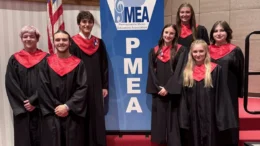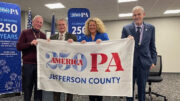COVID-19 has resulted in an unusual job market as it seems that windows in every business reveal a “now hiring” sign.
Jodi Baker-Lewis, executive director of the Franklin Area Chamber of Commerce, said the struggle to attract and maintain reliable workers is on across the board — in industry, restaurants, retail stores, and even the county.
However, even though several local businesses say challenges still exist, it seems things are finally starting to look up.
Manufacturing
Susan Williams, executive director of the Venango Area Chamber of Commerce, said fewer manufacturing employers are requiring extensive training or degrees.
“They’re looking for people who are really committed to working and they will then provide the training,” she said.
Webco Industries, which runs the Oil City Tube facility at 363 Seneca St., had a hard time with staffing during the pandemic, but the facility has returned to being fully-staffed for most of last year.
Bobbie Jones, human resources manager at PA Carbon, the Pennsylvania division of Webco, said the company considers applicants to be “qualified” with traits such as solid work history, and they will teach those who don’t have manufacturing experience.
“Our philosophy is to promote from within,” she added. “We typically hire at entry-level, and a lot of skills and training we’ll provide here, because the idea is we want folks to make a career out of Webco.”
Franklin Industries, a rolling steel mill at 645 Atlantic Ave. in Franklin, is similarly looking for employees who will stay for the long haul and be promoted from the inside.
Josh Scarbrough, the Franklin Industries farm post manager, said the company is seeing more job applications from applicants fresh out of high school or who are changing careers from a different field. The company will train them with on-the-job experience.
Filling specialty positions that require a unique skill set is trickier, though, said Lynn Brandt, the Franklin Industries workforce development manager. The company is actively recruiting for positions like mobile mechanic, mill manager or manual machinist.
Some who were in those positions are retiring, and Brandt said they take with them “a work ethic second to none.”
“It’s harder to find it in the younger generations,” she said. “But we are committed to working with the younger generation.”
Scarbrough added that younger employees tend to be more “impatient” about working their way up.
New resumes are often “so vague that we can’t go off them to find out who the employee is as a person,” he said, “with gaps of six to seven years where you have no idea what they were doing.”
Restaurants
Smaller local businesses found that post-pandemic inflation and hiring enticements led many places to significantly boost wages and hiring bonuses, and they have had a hard time competing.
Teresa Tibbs, manager of the Villa Italia Ristorante at 904 E. Second St. in Oil City, and Carlo Alfeo, who along with his wife, Pam, own Leonardo’s Restaurant & Pizzeria at 1267 Liberty St. in Franklin, said their restaurants can’t afford to pay $15 per hour wages like some of the larger chains in the area.
“It’s been hard to keep people part-time,” Alfeo added. “Not everyone can work weekends and split shifts, which is what you have to do in the restaurant industry.”
Alfeo said the pool of applicants is much smaller than in the past.
“We used to get stack of applications, but not anymore,” he said.
In some cases, the same people apply for a job over and over again, but then never show up for an interview, he said. Alfeo didn’t know the reason for this.
Barbara Matthews, owner of Liberty Street Antiques at 1239 Liberty St. in Franklin, said she has heard of hiring difficulties from larger companies, “so I think it’s business-wide,” she said.
Effects of government assistance
A common refrain from many businesses was that government assistance during the pandemic has affected people’s return to the workforce.
Brandt believed people were “skewed” in coming back to work because “unemployment bonuses were so crazy good.” She added that it especially seemed to affect those who were just going into the workforce when the pandemic hit, and then became used to getting thousands of dollars by just staying at home.
Matthews said she was puzzled by why people still seem reluctant to work, despite inflation and the end of government assistance.
“I have more questions than I have answers,” she said.
Tibbs noted that she sees less reluctance to work now that the government financial benefits are no longer there.
Still, the restaurant is seeing the puzzling trend of people applying, being hired, and then simply failing to show up for work.
“Not even for the first day,” Tibbs said.
Both Tibbs and Alfeo wondered if some of it was applicants sent to apply for jobs by the assistance office, but then not necessarily taking the jobs. Alfeo added that he doesn’t know because he hasn’t had to fill out forms for the office lately.
“Whenever applicants would come to me from the welfare office or the jail, I used to have to sign a paper saying that they had had an interview and put in an application,” he said. “I never have to do that anymore. I don’t know if they’re still doing the forms or what.”
Lewis believes the welfare system might have something to do with lack of workers, but added that there are lots of other factors.
“I think it used to be that we had just a few things we could fix, but now it’s just everything,” she said. “There’s transportation–we don’t have enough bus services to remote areas. There are people who would work but can’t get there.”
She added that many people don’t want to work, or have the necessary soft skills — “they don’t understand how important it is to be on time and show up every day,” she said.
Williams noted that the Venango Chamber is working hard with schools to emphasize the importance of good work skills to students, such as showing up on time, which are often looked on in a better light by employers more so than degrees or training.
What employees want
Williams said she believes flexibility is a big priority for many workers now, and even before COVID.
“People really reevaluated their priorities with how they wanted to budget time,” she said. “Some employers can provide that [flexibility], and with others, it’s not so practical.”
She added that employers are being asked to evaluate their employees’ work experience.
“Now, people are pretty bold about saying what they want,” Williams said. “It’s a very different landscape than it was in 2019.”
Tiffany Nolf, manager of the Franklin office of All Seasons Temporaries Inc. at 1228 Liberty St., added that “people are being like Goldilocks and trying things out.”
She added that the local community and employers have done a good job of “beefing things up” with attractive wages and benefits to draw people back to the workforce.
“This January has been the best we have seen in three years,” she said. “We’re seeing an increase in qualified applicants actually coming in and looking for work.”
“With the increased number of applicants we’ve seen the last couple months, especially January, I have to believe we’re heading toward an upward trend,” Nolf said.



































